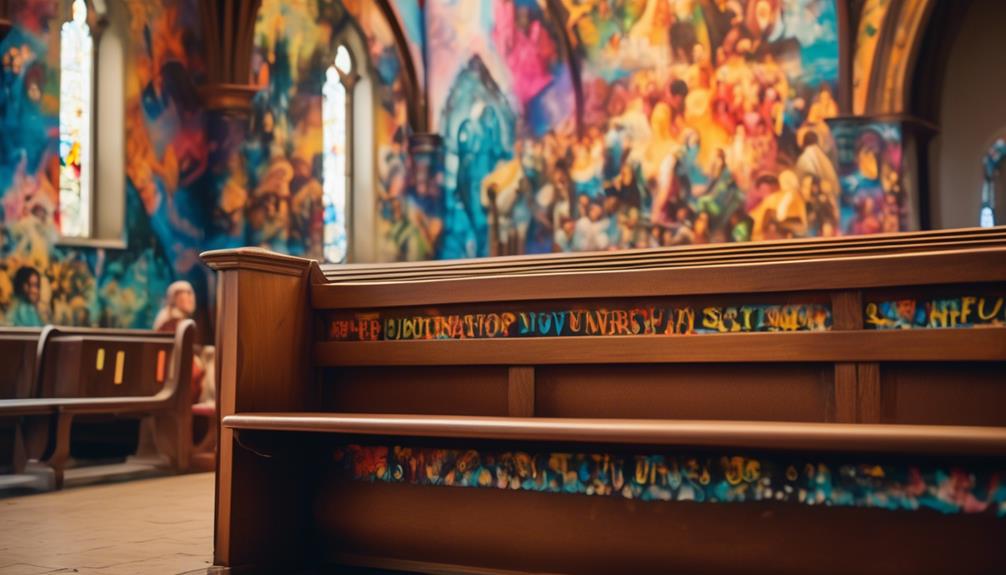Unitarian Universalism, with its emphasis on inclusivity and freedom of belief, initially drew me in. The community seemed welcoming and the principles aligned with my own values. However, as time went on, I began to question the lack of spiritual depth within the organization. While social activism was emphasized, the exploration of individual beliefs seemed to take a backseat. This left me yearning for a deeper connection to my spirituality and a desire for personal growth and fulfillment. Ultimately, after much contemplation, I made the difficult decision to leave. But why did I leave? What were the specific reasons that led me to this choice? In the following discussion, we will explore the journey that led to my departure from Unitarian Universalism and the insights gained along the way.
Key Takeaways
- Unitarian Universalism's emphasis on inclusivity and freedom of belief allows individuals to explore and develop their own understanding of spirituality.
- The evolving nature of beliefs within Unitarian Universalism can lead to a sense of uncertainty and instability for some individuals.
- Some individuals may feel that Unitarian Universalism lacks profound spiritual meaning and exploration, as it focuses more on intellectual inquiry and social justice.
- Balancing priorities between social activism and personal spiritual growth is crucial in creating a vibrant and inclusive spiritual community within Unitarian Universalism.
Initial Attraction and Beliefs

Initially attracted by the inclusive and diverse nature of Unitarian Universalism, individuals are drawn to this religious movement based on their personal beliefs and the promise of a community that embraces a wide range of spiritual perspectives. Unitarian Universalism offers a unique approach to religion, welcoming individuals from all walks of life, regardless of their religious or spiritual background. This inclusivity is a major attraction for those seeking a religious community that values freedom and individuality.
However, while attraction to Unitarian Universalism is often strong, the commitment to this religious movement can be less steadfast. One reason for this is the evolving nature of beliefs within Unitarian Universalism. Unlike more traditional religious institutions, Unitarian Universalism does not require adherence to a specific set of beliefs. Instead, it encourages individuals to explore and develop their own understanding of spirituality. This flexibility can be both liberating and challenging, as it requires individuals to continually reassess and reevaluate their beliefs.
The evolving nature of beliefs within Unitarian Universalism can sometimes lead to a sense of uncertainty and instability. Individuals may find themselves questioning their own spiritual path and feeling a lack of grounding or direction. This can make it difficult to fully commit to the Unitarian Universalist community, as the absence of a fixed belief system may leave some individuals feeling adrift.
Despite these challenges, many individuals are still drawn to Unitarian Universalism because of its commitment to inclusivity and open-mindedness. The freedom to explore and develop one's own beliefs is a powerful incentive for those seeking a religious community that embraces diversity and encourages personal growth.
Questioning the Lack of Spiritual Depth
Individuals who have been attracted to Unitarian Universalism for its inclusive and diverse nature may find themselves questioning the lack of spiritual depth within the religious movement. While Unitarian Universalism offers a welcoming environment for individuals from different religious backgrounds and beliefs, some may feel that the movement falls short in providing a sense of profound spiritual meaning and exploration.
For those seeking meaning and a deeper connection with the divine, the lack of spiritual depth within Unitarian Universalism can be a point of contention. While the movement values intellectual inquiry and promotes social justice, it may sometimes overlook the importance of personal spiritual growth and the exploration of one's own spirituality.
Unitarian Universalism has its roots in Christianity, but it has evolved into a more liberal and pluralistic religious movement over the years. This evolution has led to a focus on social justice and inclusivity, which are undeniably important aspects of any religious community. However, some individuals may feel that this emphasis on social issues has overshadowed the need for personal spiritual development.
Exploring spirituality is a deeply personal journey that involves delving into questions of purpose, meaning, and the nature of existence. While Unitarian Universalism encourages its members to question and explore, the lack of a clear spiritual framework or shared rituals can leave some individuals feeling adrift.
It is important to note that not all Unitarian Universalist congregations lack spiritual depth. Some communities may prioritize spiritual practices and provide opportunities for individuals to engage in meaningful contemplation and connection with the divine. However, for those who find themselves questioning the lack of spiritual depth within the movement, it may be necessary to seek out alternative religious communities or practices that better align with their individual spiritual needs.
Focus on Social Activism Over Individual Beliefs

The emphasis on social activism within Unitarian Universalism can sometimes overshadow the individual beliefs and spiritual practices of its members. While the commitment to social justice and making a positive community impact is a core value of Unitarian Universalism, it is important to strike a balance between activism and personal beliefs.
Unitarian Universalism is known for its strong focus on social justice and activism. Congregations often engage in various social justice initiatives, advocating for equality, human rights, environmental sustainability, and other important causes. This emphasis on social activism is a reflection of the values of freedom, justice, and equality that Unitarian Universalists hold dear.
However, some members feel that this focus on social activism can overshadow the individual beliefs and spiritual practices that initially drew them to Unitarian Universalism. While social justice work is vital, it is equally important for individuals to have the freedom to explore and develop their own spiritual beliefs and practices within the community.
Balancing priorities is crucial in creating a vibrant and inclusive spiritual community. Unitarian Universalism should strive to create a space where both social activism and personal spiritual growth can thrive harmoniously. This means providing opportunities for individuals to engage in meaningful social justice work while also nurturing their own spiritual journeys.
Seeking Personal Growth and Fulfillment
How can individuals find personal growth and fulfillment within Unitarian Universalism? Unitarian Universalism offers a unique and open-minded approach to spirituality, providing individuals with the freedom to explore alternative spiritual paths and seek community support.
One of the key aspects of Unitarian Universalism is its encouragement of exploring alternative spiritual paths. Unlike many traditional religious institutions, Unitarian Universalism does not adhere to a specific set of dogmas or beliefs. Instead, it promotes the idea that individuals should follow their own spiritual journey and seek truth and meaning in their own way. This allows members to explore various religious and philosophical traditions, incorporating ideas and practices that resonate with them personally. By doing so, individuals can find personal growth and fulfillment by aligning their spiritual beliefs with their innermost values and principles.
Another way in which individuals can find personal growth and fulfillment within Unitarian Universalism is through seeking community support. Unitarian Universalist congregations are known for fostering a sense of belonging and acceptance. They provide a safe space where individuals can connect with like-minded individuals, share their experiences, and receive support on their spiritual journey. This community support can be instrumental in finding personal growth and fulfillment, as it offers opportunities for deepening relationships, engaging in meaningful discussions, and participating in collective efforts to make a positive impact on society.
Making the Difficult Decision to Leave

Making the difficult decision to leave Unitarian Universalism can be a deeply personal and introspective process. It is a decision that is often accompanied by an emotional struggle and the loss of community. Unitarian Universalism is known for its open-minded and inclusive approach, providing a spiritual home for individuals seeking freedom and personal growth. However, there may come a time when one feels the need to move on from this community.
Leaving Unitarian Universalism is not a decision that is taken lightly. It involves a period of reflection and self-examination, as individuals evaluate their beliefs and values. It can be a challenging and emotionally taxing experience, as it may involve letting go of long-held beliefs and questioning one's own identity and place in the world.
One of the most significant challenges in leaving Unitarian Universalism is the loss of community. Unitarian Universalist congregations often foster a strong sense of belonging and connection among its members. Leaving means saying goodbye to a supportive community that has provided a space for growth, exploration, and understanding.
However, it is important to remember that leaving Unitarian Universalism does not mean severing all ties with the community. Many individuals who leave continue to maintain relationships with former congregants, cherishing the connections they have built. It is also worth noting that leaving Unitarian Universalism can open up new opportunities for personal growth and fulfillment, as individuals explore different spiritual paths and engage with diverse communities.
In the end, the decision to leave Unitarian Universalism is a deeply personal one, driven by a desire for personal growth, fulfillment, and authenticity. It is a decision that should be respected and supported, as individuals navigate their own spiritual journeys.
Frequently Asked Questions
How Can Unitarian Universalism Benefit Individuals Who Are Seeking Personal Growth and Fulfillment?
Unitarian Universalism offers individuals seeking personal growth and fulfillment a range of opportunities for personal development. Through its emphasis on individual exploration and spiritual growth, UU congregations provide a supportive community that encourages self-reflection and personal discovery. In addition to engaging in meaningful discussions and participating in spiritual practices, individuals can find support in connecting with like-minded individuals who value freedom of belief and personal expression. These aspects of Unitarian Universalism can contribute to an individual's journey towards personal growth and fulfillment.
What Are Some Common Criticisms of the Focus on Social Activism Over Individual Beliefs Within Unitarian Universalism?
Common criticisms of the focus on social activism over individual beliefs within Unitarian Universalism include concerns about the impact on personal spiritual growth and the potential dilution of theological principles. Critics argue that the emphasis on social justice can overshadow the development of one's own beliefs and personal connection to spirituality. They question whether the focus on external activism allows sufficient space for individual exploration and personal fulfillment. These criticisms reflect a desire for a balanced approach that recognizes both the importance of social engagement and the need for individual spiritual development.
Are There Any Specific Spiritual Practices or Rituals That Are Lacking in the Unitarian Universalism Community?
Within the Unitarian Universalism community, there has been some discussion around the specific rituals and spiritual practices that are lacking. While Unitarian Universalism emphasizes individual exploration and freedom in matters of belief, some individuals feel that there could be more structured and intentional practices to foster a deeper sense of spirituality. This desire for specific rituals and spiritual practices stems from a desire for a more tangible and embodied expression of one's faith, which may vary from person to person.
How Does Unitarian Universalism Address the Concept of Spirituality and the Search for Deeper Meaning in Life?
Unitarian Universalism addresses the concept of spirituality and the search for deeper meaning in life by providing a diverse and inclusive space for personal exploration. It encourages individuals to engage in self-reflection, intellectual inquiry, and the pursuit of personal transformation. Within Unitarian Universalism, there is a freedom to explore various spiritual practices, rituals, and beliefs, allowing members to find their own unique path to spirituality. This inclusive approach fosters a sense of community and supports individuals in their spiritual journey.
What Factors or Experiences Typically Contribute to the Difficult Decision of Leaving Unitarian Universalism?
Factors and experiences that often contribute to the difficult decision of leaving Unitarian Universalism can vary greatly among individuals. Some common factors may include a lack of connection or resonance with the religious or spiritual practices, a shift in personal beliefs or values, disagreement with the community's stance on certain social or political issues, or a desire for a more structured or traditional religious experience. Personal growth and the search for deeper meaning in life can also play a role in this decision-making process.
Conclusion
In conclusion, the decision to leave Unitarian Universalism stemmed from a desire for spiritual depth and personal growth that was not being met within the community. The focus on social activism overshadowed individual beliefs, leaving a sense of unfulfillment. While difficult, the departure allowed for exploration of alternative paths that could provide a greater sense of purpose and meaning. Ultimately, the journey led to a transformative experience that was akin to stepping out of a confined room into a vast, uncharted landscape.

